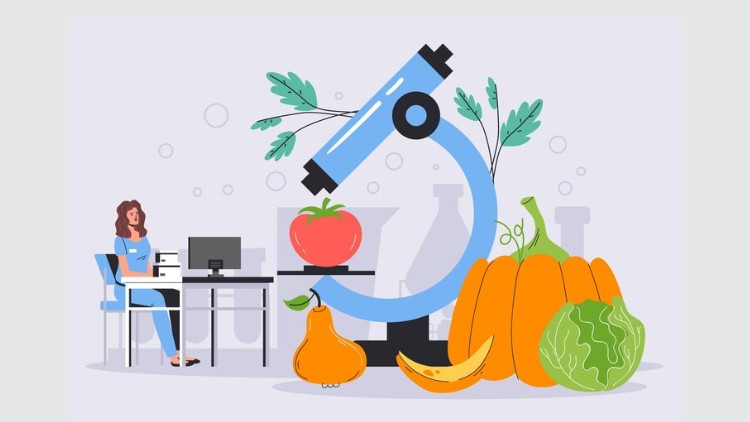
A Multidisciplinary Approach to Food Science
What you will learn
Comprehensive understanding of the chemical processes and reactions in food.
Exploration of food components and their transformations during processing and digestion.
Analysis of the impact of food biochemistry on nutritional value and sensory qualities.
Application of food biochemistry principles to product development and quality control.
Integration of scientific knowledge with practical skills relevant to the food industry.
Add-On Information:
Note➛ Make sure your 𝐔𝐝𝐞𝐦𝐲 cart has only this course you're going to enroll it now, Remove all other courses from the 𝐔𝐝𝐞𝐦𝐲 cart before Enrolling!
-
- Explore the molecular foundations of food, bridging raw ingredients to their final forms, considering desirable and undesirable transformations.
- Deconstruct food macromolecules like proteins, carbohydrates, and lipids to understand how their structures dictate texture, stability, and functionality.
- Analyze enzymatic transformations for ripening, fermentation, and flavor, learning control for optimal outcomes or spoilage prevention.
- Investigate non-enzymatic browning reactions (Maillard, caramelization) crucial for creating appealing colors, aromas, and tastes in processed foods.
- Delve into lipid oxidation, the primary cause of rancidity, and discover biochemical strategies like antioxidants to preserve freshness and extend shelf-life.
- Examine microbial food spoilage, understanding enzyme degradation and toxin formation, alongside advanced biochemical preservation techniques.
- Understand the diverse array of bioactive compounds (phytonutrients, antioxidants, prebiotics), their health benefits, and how processing impacts bioavailability.
- Investigate molecular structures behind food allergies and intolerances, tracing biochemical pathways and discussing detection and management strategies.
- Explore biotechnological applications, including genetic engineering, to enhance nutritional profiles, crop resilience, and develop novel food ingredients.
- Learn advanced analytical techniques (e.g., chromatography, spectroscopy) to identify, quantify, and characterize specific biochemical components in food systems.
- Discuss the dynamic interactions between food components and the human gut microbiome, influencing nutrient absorption, metabolic health, and overall well-being.
- Analyze the biochemical impact of various cooking and industrial processing methods (e.g., thermal, high-pressure) on food integrity, safety, and sensory attributes.
-
- PROS:
- Direct Industry Relevance: Acquire highly sought-after skills for R&D, quality assurance, food safety, and process optimization roles in the global food industry.
- Enhanced Problem-Solving: Develop critical thinking to address complex challenges in food spoilage, allergenicity, nutritional degradation, and sensory defects.
- Innovation & Development: Gain foundational knowledge to conceptualize and develop novel food products, ingredients, and processing techniques, meeting evolving consumer demands.
- CONS:
- Rigorous Prerequisites: This course demands a strong background in organic chemistry, general biology, and basic biochemistry, potentially challenging for those without adequate preparation.
English
language